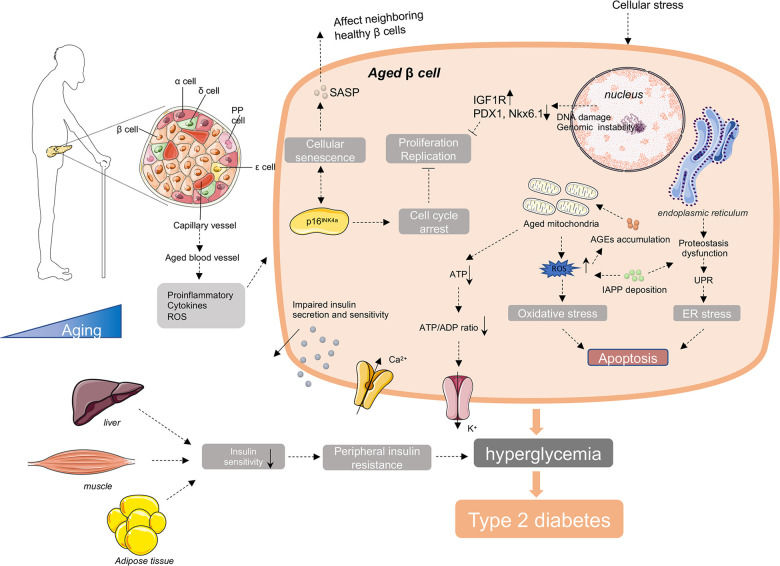Type 2 diabetes mellitus (T2DM) has become a major public health issue, with its prevalence rising sharply among aging populations. The disease, characterized by insulin resistance and defective insulin secretion, results from a complex interplay of genetic and environmental factors, with aging mechanisms playing a pivotal role in its onset and progression.
 Fig. 1 Molecular mechanisms involved in age-related diabetes. (Zhu M, et al., 2021)
Fig. 1 Molecular mechanisms involved in age-related diabetes. (Zhu M, et al., 2021)
At CD BioSciences, we specialize in discovering T2MD drugs targeting aging mechanisms. Our comprehensive approach targets the underlying biological pathways that contribute to T2DM, facilitating the development of effective therapeutic interventions.
T2DM Drug Discovery Targeting Aging Mechanisms
Drug discovery targeting insulin resistance in aging
Insulin resistance, a hallmark of T2DM, is exacerbated by aging. We utilize high-throughput screening to evaluate a diverse range of drug candidates capable of modulating insulin signaling pathways, aiming to discover novel agents that can effectively combat insulin resistance in the elderly. We also help clients discover potential insulin sensitizers that can improve glucose uptake and utilization, thereby reducing hyperglycemia.
Drug discovery targeting age-related impairment of β-cell function
The age-associated decline of β-cell function contributes to the progression of T2DM. We help clients investigate therapeutic agents that promote β-cell survival, proliferation, and resilience, leading to improved insulin secretion and glycemic control.
Drug discovery targeting age-associated lipid alterations in T2DM
Aging induces several alterations in lipid metabolism, contributing to insulin resistance and the progression of T2DM. We support clients in the development of drugs to normalize lipid metabolism. We help clients with novel peroxisome proliferator-activated receptor (PPAR) modulators that can effectively target lipid metabolism dysregulation in the elderly. We also help clients develop drugs that inhibit excessive lipolysis, potentially reducing elevated levels of free fatty acids (FFAs).
Drug discovery targeting inflammaging in T2DM
We assist clients in developing anti-inflammatory drugs that can reduce the inflammatory burden in T2DM, thereby improving healthy aging.
Drug discovery targeting age-associated mitochondrial dysfunction in T2DM
Aging significantly impacts mitochondrial function, exacerbating insulin resistance and β-cell dysfunction in T2DM. We help clients develop drugs that can improve mitochondrial efficiency and biogenesis, thereby restoring metabolic homeostasis in aging.
Evaluation of Anti-Aging Drugs in T2DM
We offer specialized services to evaluate whether anti-aging drugs have therapeutic potential in T2DM.
- Analysis of the mechanism of action. We provide in-depth analyses of how anti-aging drugs may influence aging mechanisms contributing to T2DM, such as insulin resistance and chronic inflammation.
- Efficacy assessment. Utilizing in vitro and in vivo models, we evaluate the pharmacological effects of anti-aging drugs on key metabolic parameters, including glucose tolerance and insulin sensitivity.
- Safety assessment. We help clients assess the safety of potential T2DM therapeutics, assessing whether they are suitable for application in aging populations.
CD BioSciences is committed to addressing the complex interplay between aging and T2DM. Our platform synergizes aging biology with drug discovery expertise, offering end-to-end solutions. If you are interested in our services, please feel free to contact us or make an online inquiry.
References
- Zhu M, et al. β cell aging and age-related diabetes. Aging (Albany NY), 2021, 13 (5): 7691-7706.
- Longo M, et al. Diabetes and Aging: From Treatment Goals to Pharmacologic Therapy. Front Endocrinol (Lausanne), 2019, 10: 45.
All of our services and products are intended for preclinical research use only and cannot be used to diagnose, treat or manage patients.



 Fig. 1 Molecular mechanisms involved in age-related diabetes. (Zhu M, et al., 2021)
Fig. 1 Molecular mechanisms involved in age-related diabetes. (Zhu M, et al., 2021)